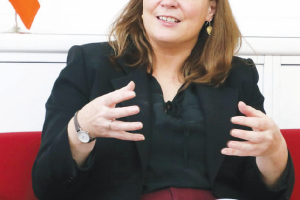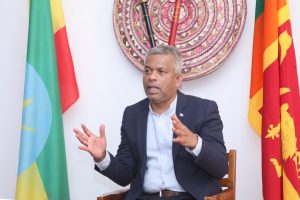
Africa, a continent blessed with abundant agricultural resources, paradoxically remains a poor and backward continent that is not guaranteed food self-sufficiency. Despite having a few agricultural products that bring in foreign currency, the rate of raw agricultural product production is insufficient to meet the growing demands of exporters.
The continent faces significant challenges in achieving food sovereignty, stemming from various interrelated factors. These include heavy dependence on imported food, inadequate agricultural productivity, insufficient infrastructure, the impacts of climate change, limited market access for smallholder farmers, political instability, and a legacy of colonial agricultural policies that favored export crops over local food production. As a result, the continent remains vulnerable to fluctuations in global markets and price volatility, hindering many individuals’ ability to produce enough food for their own consumption.
Our guest today is Ambassador Josefa Leonel Correia Sacko, an Angolan agronomist, economist, and diplomat. Before transfer the positionShe currently served as the Commissioner for Agriculture, Rural Development, Blue Economy, and Sustainable Environment of the African Union Commission.
Before her election as AU Commissioner, Mrs. Sacko was the special adviser to the Minister of Agriculture, advising on international cooperation issues, both bilateral and multilateral. She also served as the Secretary-General of the Inter-African Coffee Organization, representing the economic interests of 25 African coffee producers, managing the Secretariat, and making recommendations.
At one point, she served as the Acting Chairperson of the African Union Commission in the absence of the Chairperson. The Ethiopian Herald conducted a brief interview with Mrs. Sacko, allowing her to discuss the Comprehensive African Agriculture Development Programme (CAADP), Africa’s policy framework for agricultural transformation, wealth creation, food security, nutrition, economic growth, and prosperity.
She also elaborated on other efforts of the commission to ensure food sovereignty by seeking mechanisms and devising policies and strategies to minimize the cost of importing food-related items. The interview covered a wide range of issues directly and indirectly related to the African Union. Enjoy the read!
Thank you very much for your time and willingness to provide this interview for our esteemed readers.
It is clear that Africa has been facing a wide range of challenges for centuries, and food sovereignty is a pressing issue in the current climate. How do you think Africa can address the food dependency it is experiencing?
Africa is food insecure, with a high proportion of the population currently experiencing hunger. Recent estimates indicate that 282 million people in Africa are facing hunger, which is an increase of 57 million people since the onset of the COVID-19 pandemic. A larger percentage of the population in Africa faces hunger compared to other regions of the world, at about 20%, while the global average is 10%. More than a billion people are unable to afford a healthy diet.
The main triggers include internal conflicts such as the war in Sudan, global conflicts like the Russia-Ukraine crisis, climate change, and deteriorating economic conditions such as inflation that make food unaffordable.
The current trajectory of hunger is unacceptable. You are absolutely correct in stating that what we need now is food sovereignty. By 2050, we must be able to feed our 2.4 billion population and cease spending approximately $100 billion on food imports annually, as this is an expense we can ill afford. We should take advantage of the African Continental Free Trade Agreements to enhance food production.
Luckily, the continent has all the natural ingredients needed to expand agricultural production. Compared to much of the rest of the world, the continent has about 65 percent of the world’s available arable land, an abundance of freshwater, a young and increasing labor force, a rising middle class, coupled with a surge in urbanization, and large regional markets, especially with the signing of the Continental Free Trade Area (CFTA) in March 2018 in Kigali, Rwanda.
One of the legacies of the current administration in the African Union is the CAADP Strategy and Action Plan (2026-2025) and the associated “Kampala CAADP Declaration” that were endorsed by African Heads of States last month (January 2025) in Kampala, Uganda. It emphasizes agrifood systems transformation in Africa rather than the narrow agriculture sector and proposes several actions to make Africa food sovereign.
The CAADP Strategy and Action Plan (2025-2036) has six strategic pillars that Africa must champion with conviction:
- Promoting sustainable food production, agro-industrialization, and trade.
- Stimulating investment and financing for transformation.
- Ensuring food and nutrition security for all.
- Promoting inclusion and equitable livelihoods.
- Building resilient agri-food systems.
- Strengthening the governance of agri-food systems.
What opportunities and challenges does Africa face in achieving food self-sufficiency through the promotion of mechanization for smallholder farmers?
While African agriculture is still predominantly rain-fed and led by small-scale farmers with low productivity, the continent is also the least mechanized continent in the world. It is estimated that about 65% of farm power is still provided by human muscles, with the rest coming from draught animals (25%) and engine power, contributing only about 10%. The current trend shows that the youth are migrating from rural areas to urban areas in search of better opportunities, leaving the elderly, mostly women and children, to tend the farms. For these reasons, one of the resolutions under Commitment number 3 of the 2014 Malabo Declaration identifies agricultural mechanization as a key factor in achieving the target of doubling agricultural productivity levels by 2025.
Sustainable agricultural mechanization is crucial for Africa to enhance agricultural productivity, promote agro-processing, and decrease post-harvest losses.
Working with FAO, the African Union Commission developed a framework for agricultural mechanization that was launched in October 2018.
However, the use of sustainable agricultural mechanization in Africa, especially in Sub-Saharan Africa, is at a low level compared to other continents.
Following the launch of the F-SAMA, several efforts are ongoing to popularize and implement the framework. As of December 2024, 14 webinars had been organized with 85 speakers, attracting 2330 participants from 75 countries. The participants in the webinars come from the private sector, agricultural machinery manufacturers and distributors, farmers and farmers’ organizations, non-profit organizations, Directors/Heads of Agricultural Mechanization and Engineering Services (DAMES) from all African countries, and representatives of the Regional Economic Communities (RECs), AUC, and FAO.
Eight AU member states (Benin, Chad, Ghana, Liberia, Mali, Sierra Leone, Togo, and Zambia) have developed or updated national sustainable agricultural mechanization strategies based on F-SAMA.
To support mechanization, the former Chairperson of the African Union Commission, Dr. Nkosazana Dlamini Zuma, launched a campaign to “retire the hand-held hoe to the museum” at the 25th Ordinary Session of the Assembly of the Heads of State and Government of the African Union in June 2015 in South Africa. She symbolically presented a power tiller to each African Head of State and Government to signify the push for rapid agricultural mechanization in Africa.
The AUC has kept up the momentum in implementing this initiative. On October 15, 2019, a statue titled “Retiring the Hoe to the Museum” was unveiled in the Burkina Faso town of Bobo Dioulasso to symbolize the continental effort to promote agricultural mechanization among women and enhance food production. Five International Days of Rural Women are celebrated annually to acknowledge and amplify women’s contributions to agrifood systems and advocate for mechanization for women throughout the value chain.
It is undeniable that the lack of sustainable peace and security presents a significant obstacle to Africa’s development as a whole. How do you think Africa can ensure peace and security across the continent?
The African Union has an initiative called “Silencing the Guns” aimed at ending all wars, civil conflicts, gender-based violence, violent conflicts, and preventing genocide on the continent by 2020. Unfortunately, this goal has not been achieved yet. We must intensify efforts to implement it.
Additionally, the African Union Peace and Security Council is actively engaged in preventive diplomacy. It is crucial that we continue to support them with the necessary funding, as it is still largely donor-driven.
The African Union heavily relies on external donors and financiers despite having vast untapped natural resources. Why do you think Africa continues to depend on these sectors? What is your opinion on this?
You are correct. A major challenge for the African Union has been its extensive reliance on donor funding to operate. Despite making progress, member states’ financial contributions to AU initiatives remain minimal, with approximately 75% of financing coming from external partners, particularly the European Union (EU) and the United Nations.
Additionally, several member states have outstanding arrears in the payment of annual dues.
In July 2016, African Heads of State and Government made a historic decision by adopting a 0.2% levy to ensure that all member states pay their yearly contributions to the AU in full and on time. This decision mandates all AU member states to implement a 0.2% levy on eligible imports into the continent to finance the AU and establish sustainable, predictable, equitable, and accountable financing. However, this decision has not been fully implemented yet. If funding shortfalls persist, the AU’s financial independence and, consequently, African ownership of its agenda will remain out of reach.
President Trump recently disbanded USAID and placed its workforce on leave. What impact do you believe this decision will have?
This decision will have numerous negative impacts on several African countries that are dependent on USAID funding. For example, funding for HIV/AIDS treatment could be affected.
African governments must act swiftly, as Nigeria has done, by seeking new partners such as China and emerging donors like the Arab countries (Kuwait, Saudi Arabia, Oman, etc.).
What are the expectations for the next Chairperson of the African Union Commission after Moussa Faki Mahamat?
Continuity is crucial. The years from 2017 to 2025 marked a transformative period for the Commission, led by Chairperson Moussa Faki Mahamat.
Despite significant global and continental challenges, the AUC showed resilience, innovation, and strategic action in addressing crises under the guidance of the Heads of States and Governments of the African Union.
Despite complex circumstances, the African Union Commission (AUC) demonstrated strong leadership during major health crises, particularly the COVID-19 pandemic, which tested Africa’s capacity for a collective response. This period laid a solid foundation for accelerating the implementation of Africa’s development blueprint, Agenda 2063. A significant achievement during this time was the operationalization of the African Continental Free Trade Area (AfCFTA), a groundbreaking initiative involving Africa’s 55 countries, representing the world’s largest free trade area with immense potential for transforming intra-African trade and economic integration.
To amplify Africa’s voice on global platforms, the African Union (AU) was admitted as a permanent member of the G20 in September 2023, providing a unique platform for Africa to contribute to global economic governance and decisions.
Thank you, Her Excellency, for your time and willingness.
You are always welcome.
BY GIRMACHEW GASHAW
THE ETHIOPIAN HERALD SATURDAY 15 FEBRUARY 2025




